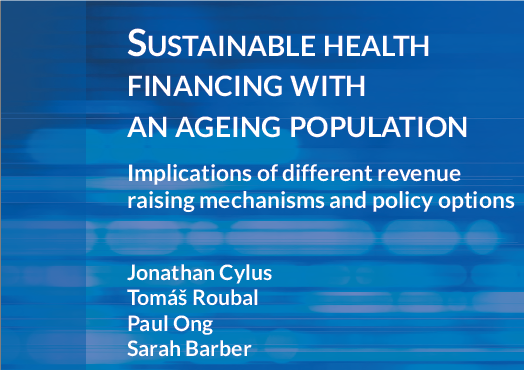
March 2018 – December 2023
European Observatory for Health Systems and Policies
Global
Background
With population ageing and higher health expenditures among older persons, policy-makers may assume that ageing will result in unconstrained growth in health spending. Population ageing may also affect a country's ability to generate revenues for health, depending on how revenues for health are generated. WHO WKC partnered with the European Observatory on Health Systems and Policies as part of their Economics of Ageing Paper Series and the WHO Health Financing Team to study the impact of shifting age demographics on health care expenditure trends and the ability to finance health.
Methods
Using data from the European Union (EU), Japan, and Indonesia, we simulate the effects of population ageing on the ability to raise revenues for health from income taxes, goods and services taxes, property taxes, and social contributions. We then use data from the European Union to study health expenditure patterns by age and population projections. We develop a series of hypothetical scenarios to simulate increases in volume, prices, intensity, and coverage of services for older persons.
Results
For countries with a relatively younger population currently undergoing a rapid population age-structure transition, all revenue sources have the potential to grow considerably over the medium- to long-term. The challenge is to improve tax collection and the priority given to health to take advantage of this potential. For countries with a large share of the population at older ages, revenues from social contributions linked primarily to the labour market are expected to decline substantially as a result of population ageing. We also find that health spending growth attributable to population ageing adds less than one percentage point to per person annual growth through 2060. Even under the most extreme hypothetical scenario, in which there are increases in volumes, prices, intensity, and coverage of services for older persons, the growth in health spending for EU countries is 0.85 percentage points higher than what would be expected from population ageing alone; 1.0 percentage point for Japan, and 1.67 percentage points for Indonesia.
Global implications
This research underscores the importance of moving away from financing health through labour-related contributions and premiums and, as a result, de-linking entitlement to care from the payment of contributions. Population ageing alone will not be the major driver of growth in health expenditures. Policy choices play the key role, including how services are financed and delivered, the prices paid for services and medicines, and how coverage decisions are made.
Local implications
Even under the most extreme hypothetical scenario, in which there are increases in volumes, prices, intensity, and coverage of services for older persons, the growth in health spending for Japan 1.0 percentage points higher than what would be expected from population ageing alone. This research suggests that ageing is not the major determinant of increases in spending as the population ages; however policies implemented by the regional and local government are critical to address expenditure growth while supporting the revenues needed to provide care for older adults.
Publications
Cylus J, Williams G, Carrino L, Roubal T, Barber S. Population ageing and health financing: a method for forecasting two sides of the same coin. Health Policy 2022. https://doi.org/10.1016/j.healthpol.2022.10.004
Cylus J, Roubal T, Ong P, Barber SL. European Observatory on Health Systems and Policies (2019). Sustainable health financing with an ageing population: implications of different revenue raising mechanisms and policy options. World Health Organization. Regional Office for Europe. https://apps.who.int/iris/handle/10665/331977
Williams GA, Cylus J, Roubal T, Ong P, Barber SL. The Economics of Healthy and Active Ageing. Sustainable health financing with an ageing population: will population ageing lead to uncontrolled health expenditure growth?. World Health Organization. Regional Office for Europe. https://apps.who.int/iris/handle/10665/329382
Global Simulator
The demand for applications of this research to other countries led to the development of a global simulator: Population Ageing financial Sustainability gap for Health systems (PASH) Simulator. The simulator allows any country to select policy options and determine how these choices affect expenditures and revenues for health as populations age.

